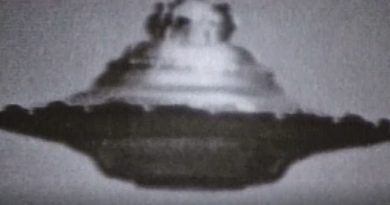Extraterrestrial breakthrough will happen in our lifetime, scientists say
A breakthrough in scientific research into extraterrestrial life could be on the horizon, leading scientists have said, as both political and scientific minds delve into the murky world of unidentified anomalous phenomena (UAPs) with new determination.
UFOs refer to aerial phenomena that cannot be immediately identified or explained, while the term UAPs is broader.
“Within our lifetime—even very soon—I think we are going to discover if there is life on other planets,” Ravi Kopparapu, planetary scientist with the NASA Goddard Space Flight Center, told Newsweek.
We are approaching a “golden moment” to which more and more scientific minds are turning their attention, he said.

Barry King/WireImage
“I would say within our lifetime we would be able to find life on other planets, there’s no question,” he added.
It is “quite possible” that evidence counting as a breakthrough on unknown phenomena could be discovered within even a year or two, said theoretical astrophysicist Avi Loeb, professor at Harvard University, who is leading its pioneering Galileo Project looking into extraterrestrial technologies.
“The Galileo Project is the first scientific project that is analyzing UAPs in a systematic fashion over a long period of time, using instruments that are fully calibrated and under control,” he told Newsweek. “So whenever you take a path that was not taken, there is a good chance you will find low-hanging fruit. And that is the way I look at it.”
The past few years have seen conversations about extraterrestrial life move from the fringe to the mainstream in both politics and science. Researchers describe a marked difference in how the search for aliens or life inside and beyond our solar system is now treated by lawmakers and the scientific community, fueled by a surge in public interest.
The U.S. military and others have logged many examples of unknown phenomena over decades, but there has been no concrete proof any are related to extraterrestrial life. Yet dramatic footage released by the likes of the U.S. Navy and veterans’ testimonies capture the interest of Congress, members of the public and scientists dedicated to looking beyond our world.
This curiosity will build, Kopparapu said. In the past 18 months, committees and research programs have sprung up to investigate possible life on other planets, and reported UFO sightings—all signs of piqued interest, he said. NASA has also held its first public briefing on UFOs, and experts say we can look to the past for missed signals and systematically monitor our skies like never before.
“I see more and more people wanting to come and work on this,” Kopparapu said. “Interest is only going to increase.”
This hunger for evidence about extraterrestrial life has been fed by explosive statements from former U.S. intelligence officer David Grusch, who claimed in June that “non-human” objects and “intact and partially intact vehicles” had been collected and hidden by the U.S. government.
Grusch then told the NewsNation network that the U.S. government had “quite a number” of these non-human craft, and that “sometimes you encounter dead pilots.”
Grusch, who had steered UAP analysis for U.S. defense authorities until earlier this year, doubled down on his claims, telling the House Oversight Committee in July 2023 that he had been barred from secret investigations run by the U.S. government. He also told lawmakers that he had not seen evidence of any alien spacecraft himself, but his testimony was based on interviews with “high level intelligence officials.”
The Pentagon has denied the claims, saying it has not found “any verifiable information to substantiate claims that any programs regarding the possession or reverse-engineering of extraterrestrial materials have existed in the past or exist currently.”
Grusch’s claims were met with both new interest and a dose of skepticism, not least as he told politicians that he could not divulge classified information without risking jail time. But researchers are now knuckling down with efforts to sift anecdotes from facts, and the storytelling from the science, with Congress sure to be watching.
Loeb’s Galileo Project applies rigid scientific analysis to UAPs and analyzing data from its observatory at Harvard University.
“It’s the first time that such a systematic study [has been] done,” Loeb told Newsweek.
Without the proof that can be checked by others and explored, “there’s no science in this, this is just all folklore,” Seth Shostak, senior astronomer for the space exploration non-profit, the SETI Institute, told Newsweek. He heaps no small amount of doubt on American-centric ideas of alien discoveries and rampant conspiracy theories, but looks forward towards new methods of scientific analysis and the many avenues open to researchers.
The Galileo Project is scouring the sky with infrared, optical, radio and audio technologies.
“We are basically taking a movie of the sky,” Loeb said.
“As a scientist, I’m really after the evidence that is of high quality. And without it, there is nothing for me to work with,” Loeb said.
Research has morphed in the past year or so, Kopparapu said, to a search for technology in our solar system and beyond it. Just as we burn fossil fuels or use chemicals, so may other, unknown civilizations, and research is now trying to find these types of signatures, he said.
Kopparapu is working to find habitable planets, ones that could have either biological life or technological life, searching for any indicators that civilizations have developed outside our solar system.
Technological life can mean anything, from signs of farming to technology far more advanced than our own.
Any moment could herald a breakthrough, Kopparapu said with confidence.
Uncommon Knowledge
Newsweek is committed to challenging conventional wisdom and finding connections in the search for common ground.
Newsweek is committed to challenging conventional wisdom and finding connections in the search for common ground.


